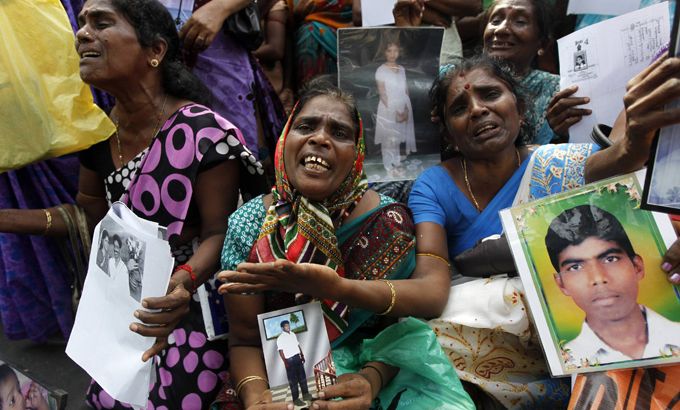Pillay says Sri Lanka turning authoritarian
UN human rights chief Navi Pillay says that four years after end of civil war people are still suffering.

The UN Human Rights High Commissioner, Navi Pillay, has warned that Sri Lanka was becoming “increasingly authoritarian” with rights activists apparently suffering growing harassment from security agencies.
Pillay said on Saturday that it was “utterly unacceptable” that rights activists who spoke with her during her fact finding mission had subsequently faced harassment by the police and the military.
“I’m deeply concerned that Sri Lanka, despite the opportunity provided by the end of the war to construct a new vibrant, all-embracing state, is showing signs of heading in an increasingly authoritarian direction,” she said.
“It is important everyone realise that although the fighting is over, the suffering is not,” Pillay told a news conference at the end of a controversial fact-finding mission to assess Sri Lanka’s progress after the 26-year war between the government and separatist Tamils.
She said that the reconstruction and the redevelopment are important achievements in the former war zones.
“However, physical reconstruction alone will not bring reconciliation, dignity, or lasting peace,” Pillay said.
“Clearly, a more holistic approach is needed to provide truth, justice and reparations of people’s suffering during the war.”
She also urged the government of President Mahinda Rajapakse to de-militarise the former war zones in the country’s east and north, following the end of the civil war in 2009.
Credible allegations
A UN panel has said it has “credible allegations” that both sides committed atrocities and war crimes, and singled out the government for most of the blame.
The UN rights chief had publicly called for a war crimes investigation into what the UN calls “credible allegations” that up to 40,000 civilians were killed during the final stages of the civil war between Tamil fighters and government troops.
Pillay began her visit last weekend after Colombo appeared to drop its public hostility towards her and the UN rights body, which has adopted two resolutions against the island in as many years.
She visited the former northern war zones in Jaffna, Kilinochchi, Mullaitivu and the eastern district of Trincomalee, and met leaders in the capital of Colombo.
Sri Lankan President Mahinda Rajapaksa told Pillay on Friday that his people believed the UN was a biased organisation, and a report she was due to release next month had already prejudged the country.
Pillay’s visit was protested outside UN office in Colombo by a group led by Buddhist monks few days ago.
The pro-government activists have accused the international community of drumming up false allegations of war crimes during the final months of a separatist conflict.